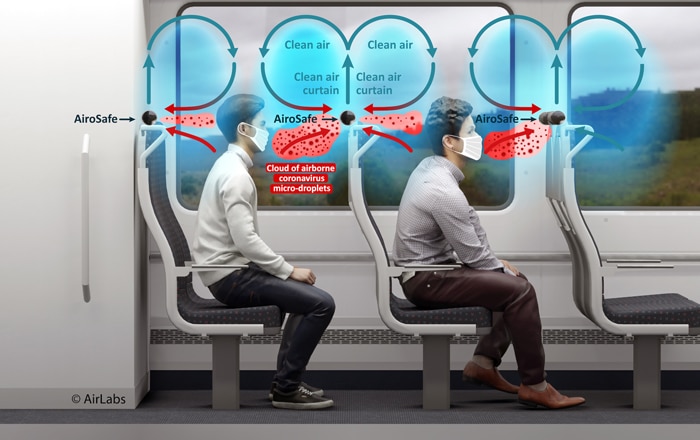AirLabs also developing new solution to protect passengers on public transport
● Warrington’s Own Buses installs AirLabs’ AirBubbl air cleaning devices in 100% of their operational fleet to decrease risk of driver exposure to the SARS-CoV-2 virus.
● AirLabs is now developing technology to remove airborne virus particles from the passenger cabins of public transport, with the first units due by October.
● Both technologies have potential to play a huge role in getting commuters safely back into work by reducing the risk of airborne transmission on buses, trains and tubes.
Warrington’s Own Buses has become the first bus company in the world to install air cleaning devices across its entire operational bus fleet, in order to best protect its drivers from the risk of airborne transmission of the SARS-CoV-2 virus.
The company has installed 86 AirLabs AirBubbl air cleaning devices in the driver cabins of their buses. The AirBubbl filters more than 95% of airborne viruses and contaminated particulate matter and floods the vehicle with over 30,000 litres of clean air every hour, to keep drivers safe as they provide vital public transport services.
AirLabs, the London-based scale up behind the AirBubbl device, is now focusing on its new air cleaning solution for the passenger cabins of public transportation, including buses, coaches and trains.
AirLabs last week received a $100,000 grant from Barclays and Unreasonable Impact to bring its COVID-19-response AiroSafeÔ technology to market. The AiroSafe is designed to remove airborne coronavirus from the passenger cabins of public transport, by creating a personal air space for every seat.
AirLabs aims to install the first passenger protection units with partners by October this year, having worked closely with key players in the rail and bus sector over recent months to develop the technology.
AirBubbl and AiroSafe could play a huge role in getting commuters back into work, reducing the risk of airborne transmission of the virus, enabling increased numbers of passengers to be allowed back on public transport and reassuring the public that it is safer to travel.
Marc Ottolini, CEO, Airlabs, said: “As lockdowns continue to ease around the world, the focus now shifts to how we can get back to business safely.
“There is increasing acceptance of the role of aerosol transmission of this virus and that the dose matters, as higher exposures can lead to more severe illness. By installing our cutting-edge technology, you can massively reduce this dose and therefore the risk of infection.
“We have had significant global interest in our air cleaning technology since the virus struck and believe that it can play a major role in reducing the risk of exposure on public transport for drivers and passengers.”
Stephen Stringer, Head of Engineering at Warrington’s Own Buses, said: “The priority for us is to protect the health and safety of our employees, who provide an essential service, and of course for our customers, the people of Warrington.
“By installing the AirBubbl devices we’re ensuring that we can reduce the risk of exposure for our staff, who have done a fantastic job in serving Warrington during this crisis.”
The 86 AirBubbl devices have been installed over recent weeks in Warrington’s Own Buses entire active fleet, as part of the company’s ‘five steps to safer working’ approach to public and driver safety.
AirLabs is already installing AirBubbl devices in 100 patient transport vehicles operated by The HATS Group, to reduce the risk of exposure for its medical workers supporting London hospitals. The company has received worldwide interest in its air cleaning devices from businesses around the world that are looking to protect their employees and customers.
Presented at the The Unreasonable Impact COVID-19 Response Global Summit, along with Barclays, the $100,000 grant has been awarded to AirLabs as one of ten organisations to support entrepreneurial solutions that are addressing immediate and long-term challenges resulting from the pandemic.
Aerosol transmission of SARS-CoV-2
A leading group of over 200 scientists wrote to the World Health Organization last week to call for greater acknowledgement of the role of airborne spread of Covid-19 and the need for governments to implement control measures.
In response, members of the World Health Organization’s technical committee have said that ‘evidence is emerging’ around the airborne transmission of the virus and that they are working on publishing a scientific brief on the topic.
Coronaviruses including SARS-CoV-2 are spread via respiratory droplets produced by infected persons when they cough, sneeze, talk or breathe. While larger droplets quickly fall out of the air, smaller droplets persist as aerosols. Smaller aerosol particles are of concern because they may stay buoyant in the air for longer, travel further and be able to penetrate further into the respiratory tract when inhaled, according to a recent study by the UK’s Defence Science and Technology Laboratory.
AirLabs has published a white paper on reducing exposure to airborne viruses using air filtration systems. It sets out the evidence behind airborne virus transmission and how air filtration can effectively remove bioaerosol particles.



